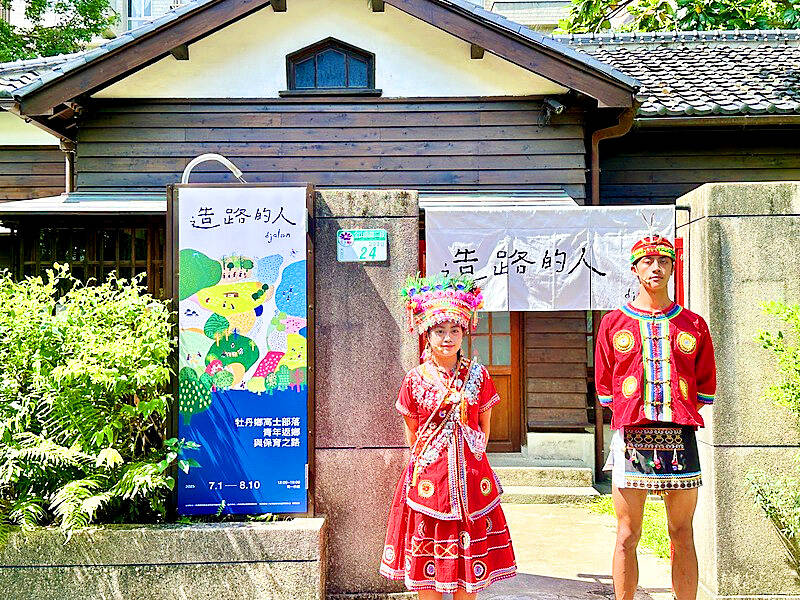An exhibition demonstrating the rejuvenation of the indigenous Kuskus Village in Pingtung County’s Mudan Township (牡丹) opened at the Forestry and Nature Conservation Agency’s conservation station in Taipei on Thursday.
Agency Director-General Lin Hwa-ching (林華慶) said they have been promoting the use and development of forestry resources to local indigenous residents for eight years to drive regional revitalization.
While modern conservation approaches mostly stem from western scientific research, eco-friendly knowledge and skills passed down through generations of indigenous people, who have lived in Taiwan for centuries, could be more suitable for the environment, he said.

Photo: CNA
The agency’s Pingtung branch Director-General Yang Jui-fen (楊瑞芬) said their branch has been promoting the coexistence of people and forests for 20 years, adding that they began collaborating with the village in 2007 on national forest protection, hike trail construction and ecological conservation.
About 90 percent of the village’s land is covered by woods, including national and public forests, making it difficult to revitalize the region through regular tourism development, she said.
However, the village developed their own under-forest economies by leveraging local natural resources and assistance from the government, attracting 11 young people to return to the village from big cities, Yang said.
An under-forest economy refers to the development of forest by-products that have economic value and can be locally produced and sold without disrupting the surrounding ecosystem.
Kuskus Village resident Kuo Mang-hsuan (郭孟軒) said that free-range chicken farming, log-cultivated shiitake mushrooms and beekeeping are the three major under-forest economies of the village.
Chickens raised in the forest peck at the weeds under trees, allowing trees’ roots to expand deeper and broader, he said, adding that those better-grown trees would have bigger canopies that can shield the chickens from attacks by eagles.
The Kuskus Community Development Association was the first entity to lease a national forest from the government to develop under-forest industries, Kuo said.
As the forest is on national land, its original ecosystems must be preserved, so industrial activities conducted on the land are required to be eco-friendly, he said.
For example, a selective thinning approach was adopted in the cultivation of shiitake mushrooms on logs to prevent soil desiccation from the lack of protection from tree canopies, Kuo added.
Kuskus Village resident Ljadam Papalicang (李玉華) said the village’s under-forest economies brought additional income for local residents and encouraged young people to return to the village.
The outflow of young people has been a problem for indigenous people who live in mountainous areas with inconvenient transportation, such as the Kuskus Village, she said.
The name of the exhibition, djalan, means “road” in the Paiwan language, Papalicang said, adding that under-forest economies help pave the road for young people of the Kuskus Village to come home.
“We hope that more young people would be willing to return to the village to support its development and pass on our cultural heritage,” she said.
The exhibition is to run through Aug. 10.

The manufacture of the remaining 28 M1A2T Abrams tanks Taiwan purchased from the US has recently been completed, and they are expected to be delivered within the next one to two months, a source said yesterday. The Ministry of National Defense is arranging cargo ships to transport the tanks to Taiwan as soon as possible, said the source, who is familiar with the matter. The estimated arrival time ranges from late this month to early next month, the source said. The 28 Abrams tanks make up the third and final batch of a total of 108 tanks, valued at about NT$40.5 billion

Two Taiwanese prosecutors were questioned by Chinese security personnel at their hotel during a trip to China’s Henan Province this month, the Mainland Affairs Council (MAC) said yesterday. The officers had personal information on the prosecutors, including “when they were assigned to their posts, their work locations and job titles,” MAC Deputy Minister and spokesman Liang Wen-chieh (梁文傑) said. On top of asking about their agencies and positions, the officers also questioned the prosecutors about the Cross-Strait Joint Crime-Fighting and Judicial Mutual Assistance Agreement, a pact that serves as the framework for Taiwan-China cooperation on combating crime and providing judicial assistance, Liang

A group from the Taiwanese Designers in Australia association yesterday represented Taiwan at the Midsumma Pride March in Melbourne. The march, held in the St. Kilda suburb, is the city’s largest LGBTQIA+ parade and the flagship event of the annual Midsumma Festival. It attracted more than 45,000 spectators who supported the 400 groups and 10,000 marchers that participated this year, the association said. Taiwanese Designers said they organized a team to march for Taiwan this year, joining politicians, government agencies, professionals and community organizations in showing support for LGBTQIA+ people and diverse communities. As the first country in Asia to legalize same-sex

MOTIVES QUESTIONED The PLA considers Xi’s policies toward Taiwan to be driven by personal considerations rather than military assessment, the Epoch Times reports Chinese President Xi Jinping’s (習近平) latest purge of the Chinese People’s Liberation Army (PLA) leadership might have been prompted by the military’s opposition to plans of invading Taiwan, the Epoch Times said. The Chinese military opposes waging war against Taiwan by a large consensus, putting it at odds with Xi’s vision, the Falun Gong-affiliated daily said in a report on Thursday, citing anonymous sources with insight into the PLA’s inner workings. The opposition is not the opinion of a few generals, but a widely shared view among the PLA cadre, the Epoch Times cited them as saying. “Chinese forces know full well that